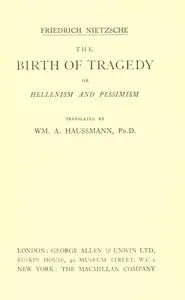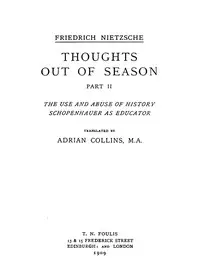"The Birth of Tragedy; or, Hellenism and Pessimism" by Friedrich Wilhelm Nietzsche is a philosophical work written in the early 19th century. This foundational text explores the origins of Greek tragedy, emphasizing the interplay between the Apollonian and Dionysian elements of art and existence. Nietzsche presents a duality where the rational and structured aspects of Apollo contrast sharply with the chaotic, passionate nature of Dionysus, ultimately arguing that both forces are essential to the human experience and the creation of art. The opening of this work provides a deep insight into Nietzsche's philosophical explorations surrounding the nature of existence and art. He reflects on experiences from his youth and the foundational influences of Hellenism, Schopenhauer, and Wagner upon his thinking. Nietzsche begins to articulate the essential conflict between the beauty represented by Apollo and the primal chaos embodied by Dionysus, suggesting that Greek tragedy arose from a reconciliation of these contrasting forces. Through this lens, he begins to question the notion of pessimism and its relationship with artistic creation, hinting at a complex relationship between joy, suffering, and the necessity of art for human life. The prologue sets the stage for the intricate analysis of Greek aesthetics that follows, inviting readers to consider the deeper implications of tragedy as a reflection of life's dualities. (This is an automatically generated summary.)

The Birth of Tragedy; or, Hellenism and Pessimism
By Friedrich Wilhelm Nietzsche
"The Birth of Tragedy; or, Hellenism and Pessimism" by Friedrich Wilhelm Nietzsche is a philosophical work written in the early 19th century. This fou...
Friedrich Wilhelm Nietzsche was a German classical scholar, philosopher, and critic of culture, who became one of the most influential of all modern thinkers. He began his career as a classical philologist before turning to philosophy. He became the youngest person to hold the Chair of Classical Philology at the University of Basel in Switzerland in 1869, at the age of 24, but resigned in 1879 due to health problems that plagued him most of his life; he completed much of his core writing in the following decade. In 1889, at age 44, he suffered a collapse and afterward a complete loss of his mental faculties, with paralysis and probably vascular dementia. He lived his remaining years in the care of his mother until her death in 1897, and then with his sister Elisabeth Förster-Nietzsche. Nietzsche died in 1900, after experiencing pneumonia and multiple strokes.


















